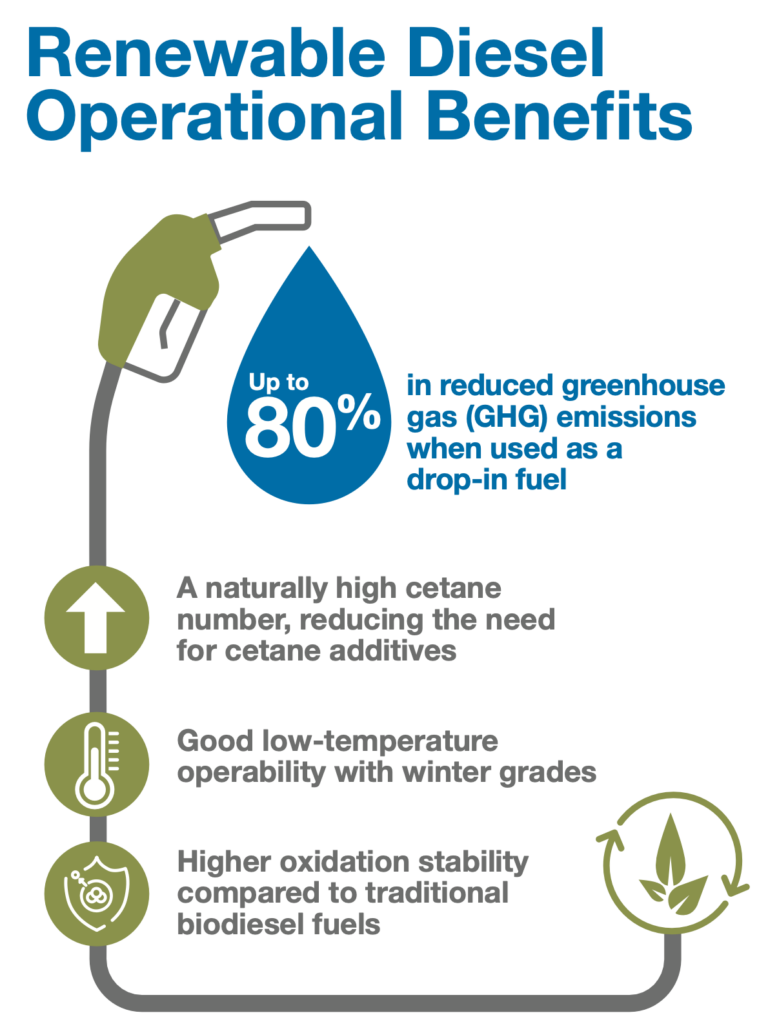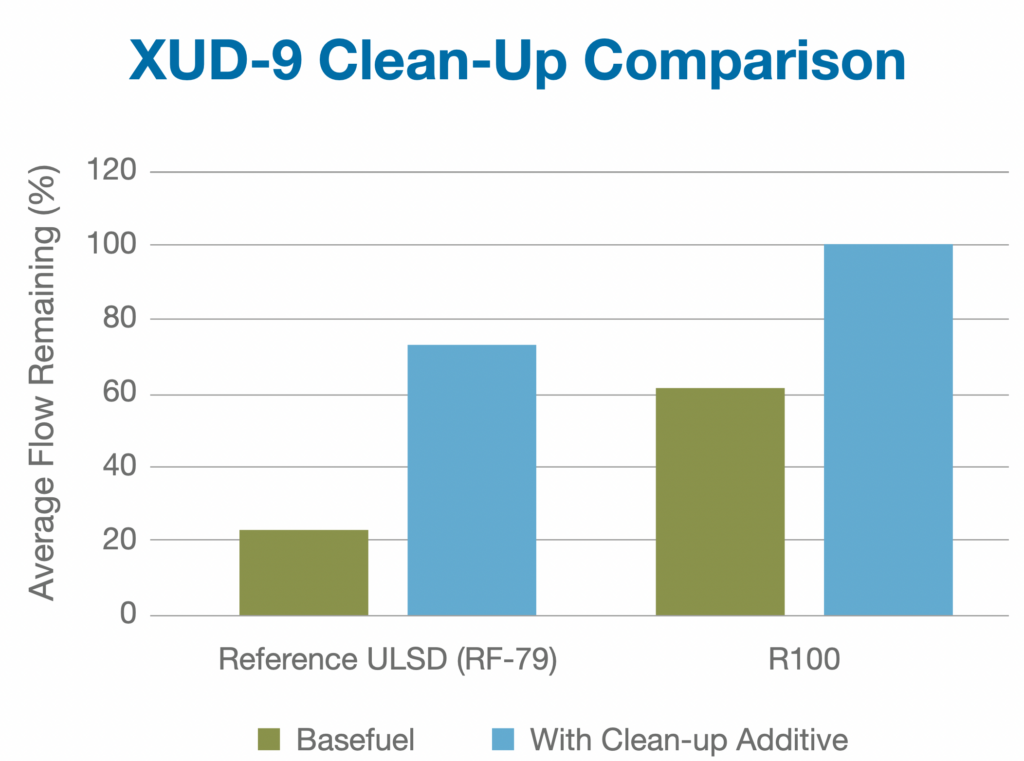Emissions reduction efforts continue apace in industries around the world. The heavy-duty diesel trucking and transportation market is one of those industries, and because full-scale electrification is still far from capable of universally replacing traditional heavy-duty diesel engines, other approaches to reduce carbon intensity are necessary.
Enter hydrogenation-derived renewable diesel (HDRD), or simply renewable diesel, an alternative that is seeing growing popularity throughout the heavy-duty market. And for good reason—renewable diesel is chemically the same as traditional diesel fuel and may be used in its pure form as a 100% drop-in fuel for today’s diesel vehicles. No modifications are required, making it a convenient and nearly hurdle-free means of reducing carbon intensity on a broad scale throughout the heavy-duty market.
The US, Canada and Europe are today incentivising the use of renewable diesel to spur its growth. For example, qualified renewable diesel has been incentivised through Renewable Fuel Standard obligations and fuel tax reductions in the US and by the European Renewable Energy Directive (RED ) II, in an effort to partially compensate for higher costs versus traditional diesel. Production capacity is also growing worldwide, making renewable diesel fuels increasingly available for fleets.
Maximising the potential for renewable diesels is critical—and doing so will require formulating these fuels with high-performance additives.

Renewable diesel defined
As defined by the US Energy Information Agency (EIA), “renewable diesel and other (non-fuel ethanol) biofuels and biointermediates can be produced from nearly any biomass feedstock, including those used for biodiesel production, through a variety of processes such as hydrotreating, gasification, pyrolysis, and other biochemical and thermochemical technologies.” The fuels meet the ASTM D975 standard for traditional diesel, allowing them to be used interchangeably in any common diesel engine.
Because they are derived from renewable feedstocks, renewable diesels currently offer reductions in greenhouse gas (GHG) emissions upward of 80% depending on the feedstocks used—a sizeable figure. Production from waste cooking oil offers the greatest carbon dioxide reductions, according to the EU Renewable Energy Directive (RED) II, which from January 2021 specifies a minimum 70% reduction in greenhouse gas emissions versus fossil fuels.
In addition to these reductions in carbon intensity, renewables bring a number of operational benefits to the table, including a naturally high cetane number, reducing the need for cetane additives; good low-temperature operability with winter grades, making them well suited for colder climates; and higher oxidation stability compared to traditional biodiesel fuels.
Maximising renewable diesel’s potential
Despite their inherent cleanliness and other benefits, renewable diesels still stand to significantly benefit from high-performance fuel additives. While renewable diesels are very clean fuels, carbonaceous deposits from combustion will still build up over the long term. It’s true that deposit formation could be delayed through the use of untreated renewable diesel, but the application of deposit control additives remains necessary for controlling and removing performance-degrading deposits.
While renewable diesels are very clean fuels, carbonaceous deposits from combustion will still build up over the long term
What is at stake when it comes to excessive deposit buildup? Over time, deposits accumulate on the injector spray nozzles and the interior moving parts of the injectors, potentially causing fuel economy losses as these deposits interfere with fuel spray patterns and even the amount of fuel delivered.
Additionally, excessive deposits inevitably interfere with a diesel drivetrain’s aftertreatment devices (diesel particulate filters (DPFs), for example). These devices are required on most diesel trucks on the road today—but suboptimal combustion caused by deposits leads to an increase in particulate formation that plugs up DPFs, requiring a truck to burn them off through a process known as regeneration (regen), which uses significant amounts of extra fuel. Regens can be performed while a truck is still operational or while a truck is idle, requiring downtime. Though regens may not be eliminated through the use of cleaner fuels, those treated with the right deposit control additives can substantially reduce the frequency of regens or other forms of time-consuming maintenance.
The benefits of deposit control additives are borne out in a conventional fouling and cleaning procedure to measure deposit formation (called XUD-9 engine testing). Lubrizol has performed this testing and has demonstrated that untreated R100 renewable diesel fuels provide reduced injector flow loss compared with untreated ULSD. The addition of cleanup additives is required to eliminate flow loss and maintain optimal performance.
Another area where untreated renewable diesel lags behind traditional diesel is in lubricity, or the fuel’s capacity to help prevent metal-on-metal wear throughout the engine’s fuel delivery system. Today’s high-pressure diesel pumps and injectors are designed to extremely tight tolerances and benefit from a fuel that delivers some lubricating properties. Enhanced wear protection from the fuel can help mitigate premature breakdowns and costly downtime.

The benefits of high-performance additives
Additive treatment for renewable diesel fuel formulations will be critical for such formulations to maximise their carbon reduction potential—but the truth is that high-performance additives can benefit all varieties of diesel fuel, and will become increasingly important as carbon reduction initiatives increase. For fleet operators, it is worth opening a conversation about the expected performance levels of diesel fuels, be they traditional or renewable. As described earlier, the right deposit control additives and lubricity improvers can lead to higher levels of engine efficiency and reliability.
For fuel formulators and marketers, working with the right additives supplier opens opportunity to differentiate from the competition. This can be especially beneficial for fuel suppliers interested in adding renewable diesels to their portfolios.
Expect renewable diesels to grow in availability and usage in the coming years. As this happens, multifunctional fuel additives that restore and maintain optimum performance of diesel vehicles will grow more important. Fleets should educate themselves on expected diesel performance and seek out high-performance formulations, while fuel marketers can work with collaborative additive suppliers to differentiate their formulators from the competition. Maximising the potential of renewable fuel formulations depends on it.
About the author: Kevin Griffith is Fuel Additives Product Manager at Lubrizol


